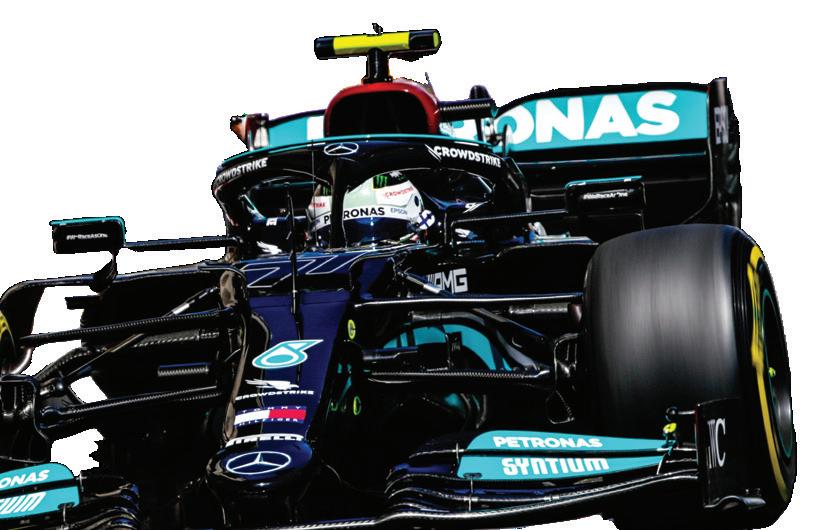
7-10 APR 2025, SÃO PAULO


7-10 APR 2025, SÃO PAULO

Just in time for a month devoted to the prevention of problem gambling, two United States potentates weighed in to apologize for one of the most disordered gamblers of all time. We speak of Pete Rose, the alltime hit king of American baseball and the country’s most famous gambling addict.
Having evidently nothing more important on his plate, the current president of the U.S. waded into the fray, opining that Rose should be absolved of his sins against sports integrity. Sure, POTUS tut-tutted, betting on baseball is bad but at least Rose bet on his own team to win.
So it’s hunky-dory in the final analysis This is a fine moral distinction of which we were hitherto unaware and we owe a debt of thanks to Mr. Trump for making it. Not!
Feeling presidential pressure, Major League Baseball Commissioner Rob Manfred signaled that he was more than open to making Rose posthumously eligible for baseball … and the Hall of Fame in Cooperstown. Thankfully, the craven Manfred can’t ipso facto put Rose into the Hall, but you can count on jockstrap-sniffing sportswriters to do that.
This apparent teapot tempest threatens the best efforts to other sports leagues to have a modicum of integrity in their games. How can you say that betting on baseball/basketball/football/ etc. is invariably bad if it’s somehow less bad to bet on your team to prevail? Joe Schmoe, first baseman, may legitimately wonder why he shouldn’t bet on himself to hit for the cycle if Rose is enshrined in Cooperstown after committing similar malfeasance.
RIGHT: David McKee, Editor in Chief, Sports Betting Operator
It’s this kind of moral screwup that gives needless ammunition to the detractors of sports betting, who are legion. You can’t do a Google news search of sports betting without landing on multiple stories about the evils of wagering. Just this week I encountered two that wailed that sports betting is “spreading like a weed.” It’s a popular simile.

Now it stands to reason that if you have more legal sports betting there will be more irresponsible players. It’s the nature of the beast. (One could get into questions of self-control and societal responsibility but won’t.) What isn’t being studied is how serious the prevalence rates were when sports betting was unlawful and covert. Remember, it was an enormous industry already, long before it became feasible to legitimize it.
If we’re hearing more about calls to gambling hotlines and reading more confessionals by sports wagering addicts, it is undoubtedly because the RG resources are now available and the problem is out in the open. And transparency — and debate — is desirable if we are to get our arms around the problem.
So, the occasional Pete Rose notwithstanding, there’s no “epidemic” of uncontrolled sports wagering abroad in the land. Calls to outlaw it altogether, such as we’re now hearing, are just so much horse feathers.

Publisher – Peter White peter@outsourcedigitalmedia.com
Editor in Chief – David McKee dmckee314@gmail.com
Editor EMEA – Damien Connelly damien@outsourcedigitalmedia.com
Las Vegas Correspondent – Ryan Slattery ryanslats@gmail.com
Associate Editor EMEA – Andrew Behan a.behan@librasgroup.com
Designer – Stewart Hyde www.de5ign.co.uk
Tel: 44 (0) 1892 740869 W: www.sportsbettingoperator.com
Editorial Policy: The views and opinions expressed in Sports Betting Operator remain principally the views of contributors and do not necessarily reflect those of the editor or publishers.
The publishers wish to avoid inaccuracies and, whilst every precaution has been taken to ensure that information contained in this publication is accurate, no liability is accepted by the editor or publishers for errors or omissions, however caused.
Unless otherwise stated, articles appearing in this publication remain the copyright of the publishers and may not be reproduced in any form without the publisher’s written consent.
Printed in the UK by Acorn Web Offset Ltd.

California is the largest untapped sports betting market in the United States and possibly the world. That fact is unlikely to change for the foreseeable future. Certainly not before 20262028.
It’s not for lack of trying that California doesn’t have sportsbooks in existing casinos. There have been several attempts to legalize wagering on sports – ever since 2018 when the U.S. Supreme Court struck down the Professional & Amateur Sports Protection Act (PASPA) of 1992 as unconstitutional. PASPA had effectively limited sports gambling to one state, Nevada. The Supreme Court opened it up to all the other 49. Since then 38 states have taken that step.
California also doesn’t allow online gaming, and in the everchanging political landscape, often those who want to legalize online gaming want to combine it with online sports betting. But not always.
While that High Court decision led to the biggest expansion of U.S. gaming since Indian Gaming itself was legalized – one as dramatic and chaotic as the Oklahoma Land Rush – California has in the intervening seven years stood tantalizing and unreachable to eager suitors like BetMGM, Caesars, FanDuel and DraftKings. The failure to launch has been just as frustrating for those inside the state who want to unlock a source of money that other states have ready access to. That includes lawmakers who want to tax the


wagers, and gaming tribes who want to snatch the lucrative prize away from nearby Las Vegas.
The reason why it hasn’t happened yet: The biggest tribal gaming players among the 73 or so total gaming operators can’t agree on what they want a sports betting landscape to look like. Any proposal must have their blessing or it won’t fly. This has been demonstrated several times, most recently in 2022. Plus, some of them fear that letting the camel’s nose of online gambling into the tent

will discourage people from physically visiting their brick and mortar casinos. So the most recent tribe-backed initiative would have allowed retail sports betting only.
Currently the only sports betting that is allowed in the nation’s most populous state with its nearly 40 million people is horse racing and daily fantasy sports. DFS companies, such as FanDuel and Draftkings, of course, want to run sportsbooks like they do in several U.S. states that have legalized sports betting.
This has also led to the rise of the “social casino” in the Golden State – where online casinos such as Chumba Casino and Pulsz California have proliferated in the last five years. Californians get bombarded regularly by ads for such casinos. These websites provide free casino play and opportunities for cash prizes, without violating the Golden State’s laws against online gaming. More importantly, they have also planted the seed of gambling on mobile platforms, even if typically no money changes hands.
Shortly after the Supreme Court’s 2018 ruling, a California lawmaker, Assemblyman Adam Gray, who had been waiting years for this opportunity, introduced a state constitutional amendment, ACA 18—but that effort failed. Gray, with state Senator Bill Dodd tried again in 2019 with another constitutional amendment that would have required two-thirds of the Legislature to put it on the 2020 ballot. That too failed.
In November 2019, 18 gaming tribes filed an initiative petition for the California Sports Wagering Regulation & Unlawful Gambling Enforcement Act. This would have legalized retail sports betting and taxed it at 10 percent.
The global Covid pandemic hit the U.S. early the next year – derailing any further efforts for a few years. This was most un-fortuitous for the group of tribes known as the Coalition to Authorize Regulated Sports Wagering – who had gotten the go-ahead on January 22 to begin collecting signatures to put another measure on the 2020 ballot. They included several of the largest gaming tribes in the state: Rincon Band of Luiseño Indians, Wilton Rancheria, the Federated Indians of Graton Rancheria and the San Manuel Band of Mission Indians.
The near-lockdown of the state hobbled their efforts, and they weren’t able to meet their deadline to gather the requisite one million signatures. They sued the state and ultimately the deadline to gather signatures was extended to October 12. Another lawsuit resulted in another extended deadline: December 14. Finally the tribes submitted 1.4 million signatures to approve for the 2022 ballot.
This allowed the California Sports Wagering Regulation & Unlawful Gambling Enforcement Act to appear on the November 2022 ballot as Proposition 26.
Proposition 26 would have only have allowed retail sports betting, because of the previously noted fear that online sports betting would drain bodies away from land-based casinos. Proposition 27 was proposed by out-of-state gambling companies, such as leading sportsbooks BetMGM, FanDuel and DraftKings, who wanted to jimmy open the tightly held tribal gaming market and wedge themselves in. Even though the initiative would have allowed tribes to host sportsbooks at their casinos, the tribes opposed anyone but them having that much control.



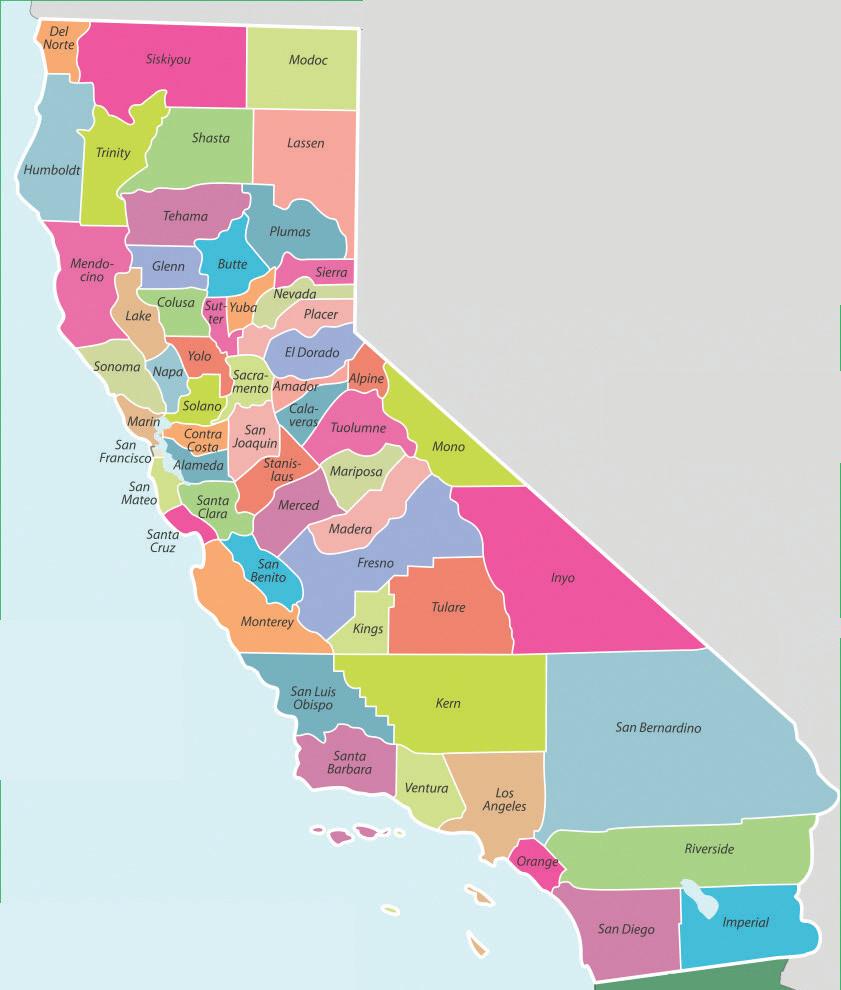
The year 2022 wasn’t a good one for sports betting. Both propositions were at swords’ points with each other and both were ultimately unpopular with the voters.
If Proposition 26 didn’t spark Californians’ enthusiasm, with “No” receiving 70 percent, Proposition 27 failed by even worse numbers: 83 percent voted No.
Both sides spent a total of nearly $500 million to play to a draw. It was an expensive lesson.
The takeaway from this is that nothing is going to happen in

California that the biggest casino tribes don’t enthusiastically support. But even that would have to be sold to the voters, who don’t automatically support gaming tribes, although that is usually – ahem – the way to bet.
Tribes do generally prefer legalizing retail sports betting ahead of legalizing online sportsbooks or even mobile apps. Even though it has been demonstrated in state after state that online sportsbooks are way more profitable.
A significant milepost in sports betting that could have a big impact in California came June, 2024 when the Supreme Court declined to hear an appeal to the D.C. Circuit Court of Appeals’ rejection to challenge to a tribal state gaming compact between Florida and the Seminole Tribe of Florida. This compact allows the tribe to offer online sports betting

throughout the entire state – not just at the tribe’s casino on Indian lands. This would allow a bettor with a mobile device anywhere in the state to make a wager with a casino based on a reservation.
That means it would be legal to do so in California too, providing gaming tribes were able to negotiate such compacts. The Appeals Court ruled that gaming compacts could take in a “multitude of topics” related to Class III gaming and that ultimately a tribe’s online gaming couldn’t be limited to just Indian lands.
California’s gaming tribes have made it clear that they – not outside sports betting interests – intend to keep hold of the steering wheel when it comes to setting the standards for sports betting
October 8, 2024, speaking on a Global Gaming Expo panel entitled “Tribal Sovereignty and Sports Betting: A Delicate Balance,” James Siva, chairman of the California Nations Indian Gaming Association (CNIGA), and vice chairman of the Morongo Band of Mission Indians gave his best guess as to when a sports betting initiative that most of the tribes can get behind would be introduced. “Maybe 2026, but probably 2028,” he said.
Siva added, “There was a lot of exhaustion” after the 2022 defeat. He continued, “I was exhausted and a lot of California leaders in this room were exhausted, but we never stopped talking about sports betting. At every CNIGA meeting, we were laying out a game plan. Everyone said maybe we should take a pause. We will take off an election cycle in 2024 and keep working on this.” He added, “We’re already looking down the road.”
Given the fate of previous sports betting initiatives, that road could be a long and winding one.

Sports Betting Operator provides technology features, news and new product information, keeping online gambling companies up to date with the fastest growing gambling sector in the world

A highly regarded team of Internationally experienced journalists, all of whom have a wealth of knowledge in online and land-based gaming involving, legislation, e-commerce, responsible gambling along with the latest online operating systems and solutions.

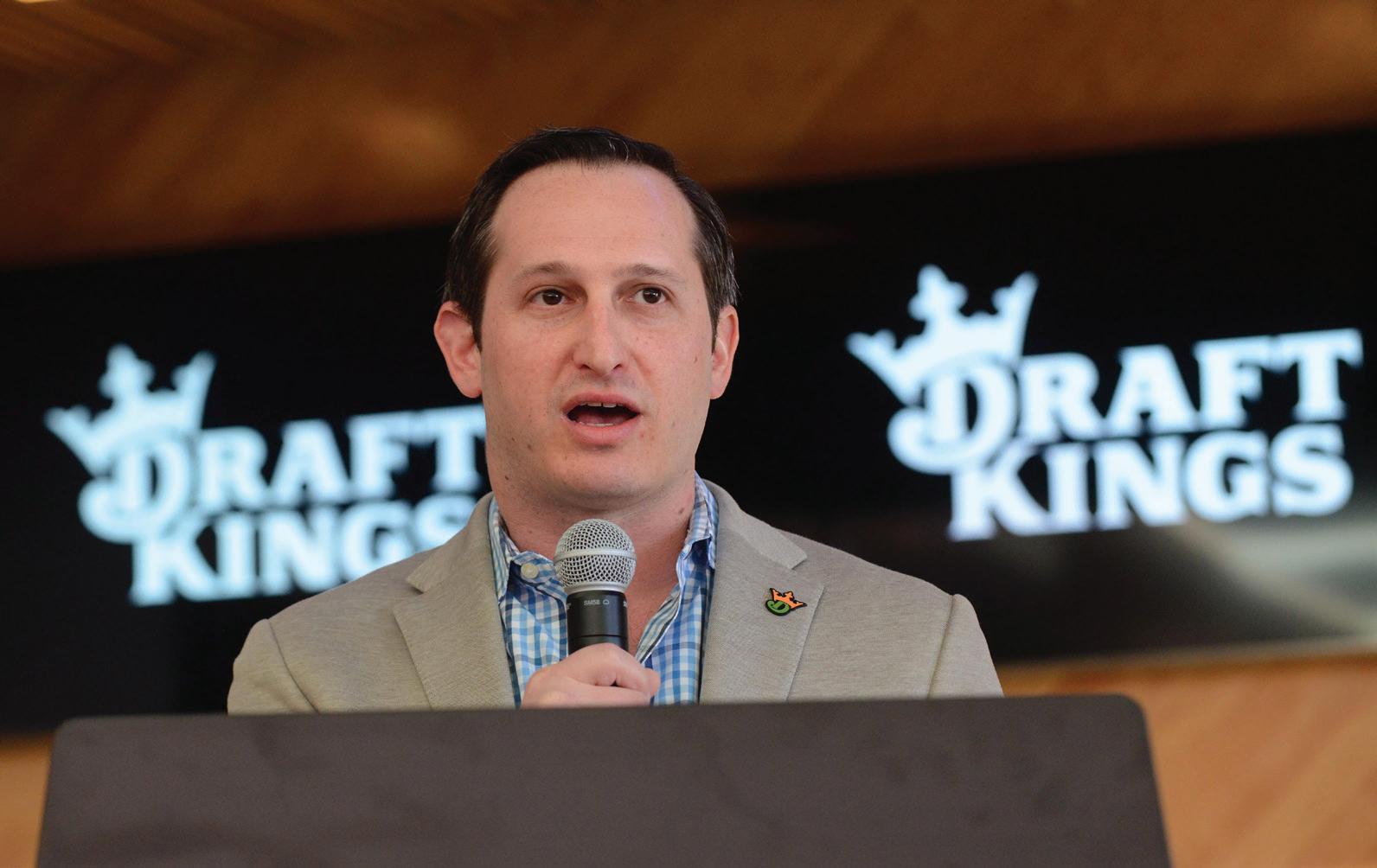
DraftKings is guardedly optimistic about its near future. By David McKee
Things were appearing sufficiently upbeat for DraftKings this winter that it pre-released its fourthquarter earnings from 2024. Having your stock riding a 17 percent surge will do that.
Wall Street analysts were pleased with what DraftKings had to show for itself. Jefferies Equity Research boffin David Katz wrote that “the strong start to the year in betting outcomes, coupled with an additional new state and growth in in-play betting accelerating, implies prospective upside.” Indeed, DraftKings raised its revenue projections, although it continued to stand pat on cash flow.
ABOVE:
Jason Robins, CEO, DraftKings
In the last trimester of 2024, DraftKings’ revenue rose 13 percent, hitting $1.4 billion. Cash flow of $89.5 million comfortably exceeded Wall Street’s expectations. Unique players grew 16 percent – but 36 percent when lottery service Jackpocket was added. (More of Jackpocket later.)
In 2025, DraftKings now expects $6.3 billion to $6.6 billion in revenue and cash flow of at least $900 million, perhaps $1 billion, a huge positive return on investment. (Katz predicts $993 million.) Those numbers may be conservative, as they do not take into account the addition of Missouri to the roster of U.S. states where sports betting is legal.
After DraftKings’ mid-February earnings call, Katz was just as optimistic. He noted that the company hoped to improve its hold percentage, thanks to increasing numbers of proposition bets and single-game parlays – low-return wagers that have proven lucrative for arch rival FanDuel. (FanDuel holds 14.5 percent of monies wagered, DraftKings 11 percent.)
Katz also observed that DraftKings “is interested in establishing itself in the debt market, despite ample cash.” Although the company is sitting on $788 million in cash, it desires to borrow money for recently incepted stock repurchases.
Alluding to American sports books’ misfortune at the hands of NFL teams, Truist Securities analyst Barry Jonas wrote that DraftKings “lost some games but won the quarter.” He pointed to the most recent Super Bowl, which saw the most single-day betting volume and gross gambling revenue in the company’s history.
Jonas explained, “Revenues were driven by continued healthy engagement, effective customer acquisition, expansion into new jurisdictions, higher structural hold and the Jackpocket acquisition, partially offset by well-known unfavorable NFL.”
The 2024-5 NFL season was deemed to be “overall the least favorable in the last 40 years (with 10 weeks where favorites won 75 percent-plus of games).”
In dollars and cents, that meant $160 million less revenue for DraftKings and $104 million lower cash flow. Fortunately, 2025 is said to be off to a strong start, with hold reaching 13 percent and “acquisition, retention and engagement have been strong,” according to Jonas.
The good news didn’t stop there. The DraftKings app was the most-
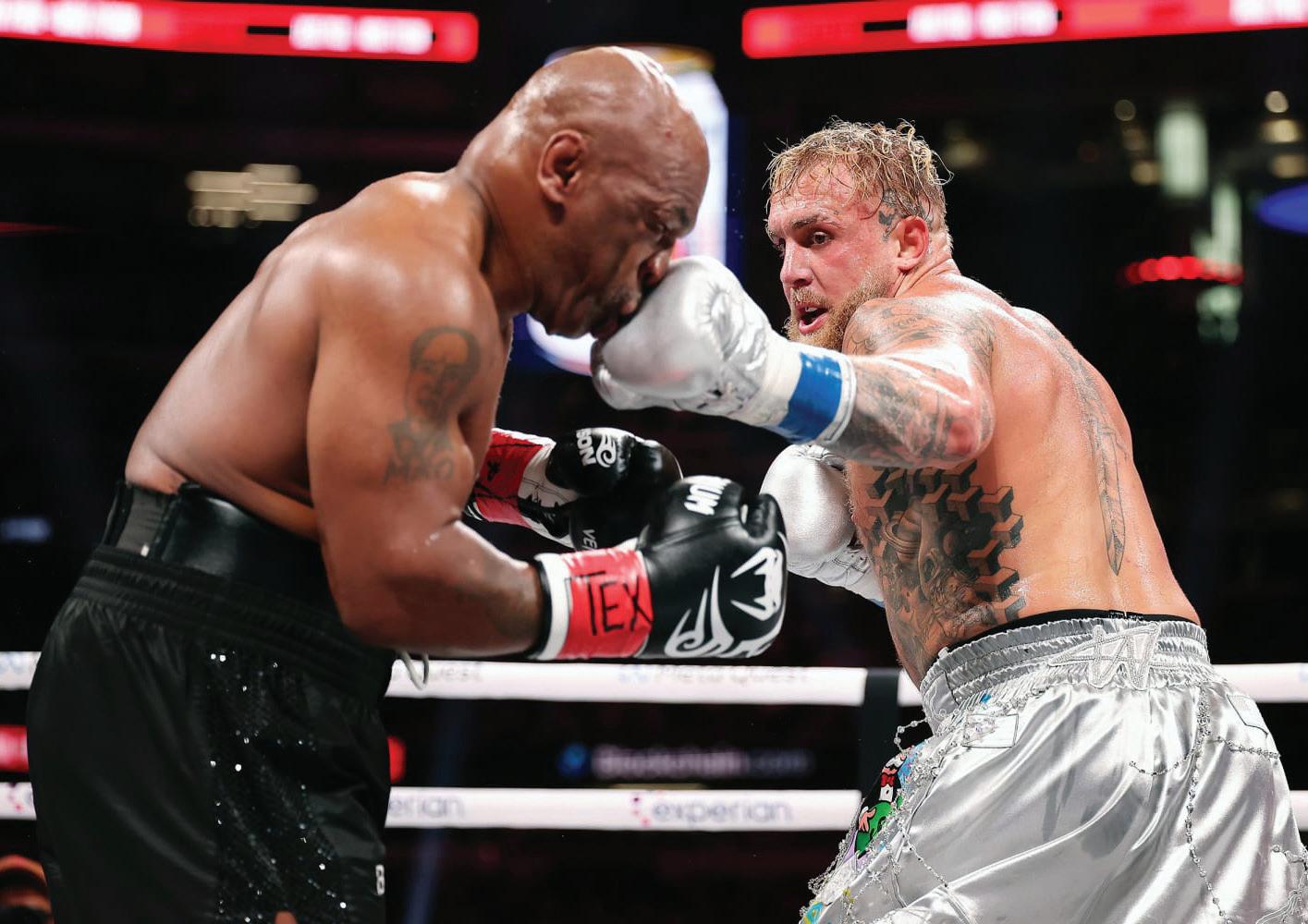
downloaded betting application from stores and the third-most overall. Handle grew 21 percent from 2023 and 3.5 million new customers were acquired. Unique customers grew 42 percent in 2024, to 10.1 million.
DraftKings’ biggest non-football event for customer acquisition might not even be called sports: It was the tomato-can bout between Jake Paul and a superannuated Mike Tyson. (No surprise, Tyson lost.) DraftKings was even feeling its oats sufficiently to talk about branching out beyond North America.
One challenge DraftKings execs didn’t anticipate lies in the aforementioned Missouri. There, new Secretary of State Denny Hoskins is finding new and creative ways to postpone the launch of sports betting. Hoskins long wanted to tie sports wagering to the legitimization of black-market slot machines, so his motivations are open to question. For DraftKings, the earlier the 2025 debut in Missouri, the better for its bottom line.
But a steep tax hike in Illinois has been mitigated, at least partly. DraftKings has reduced the intensity
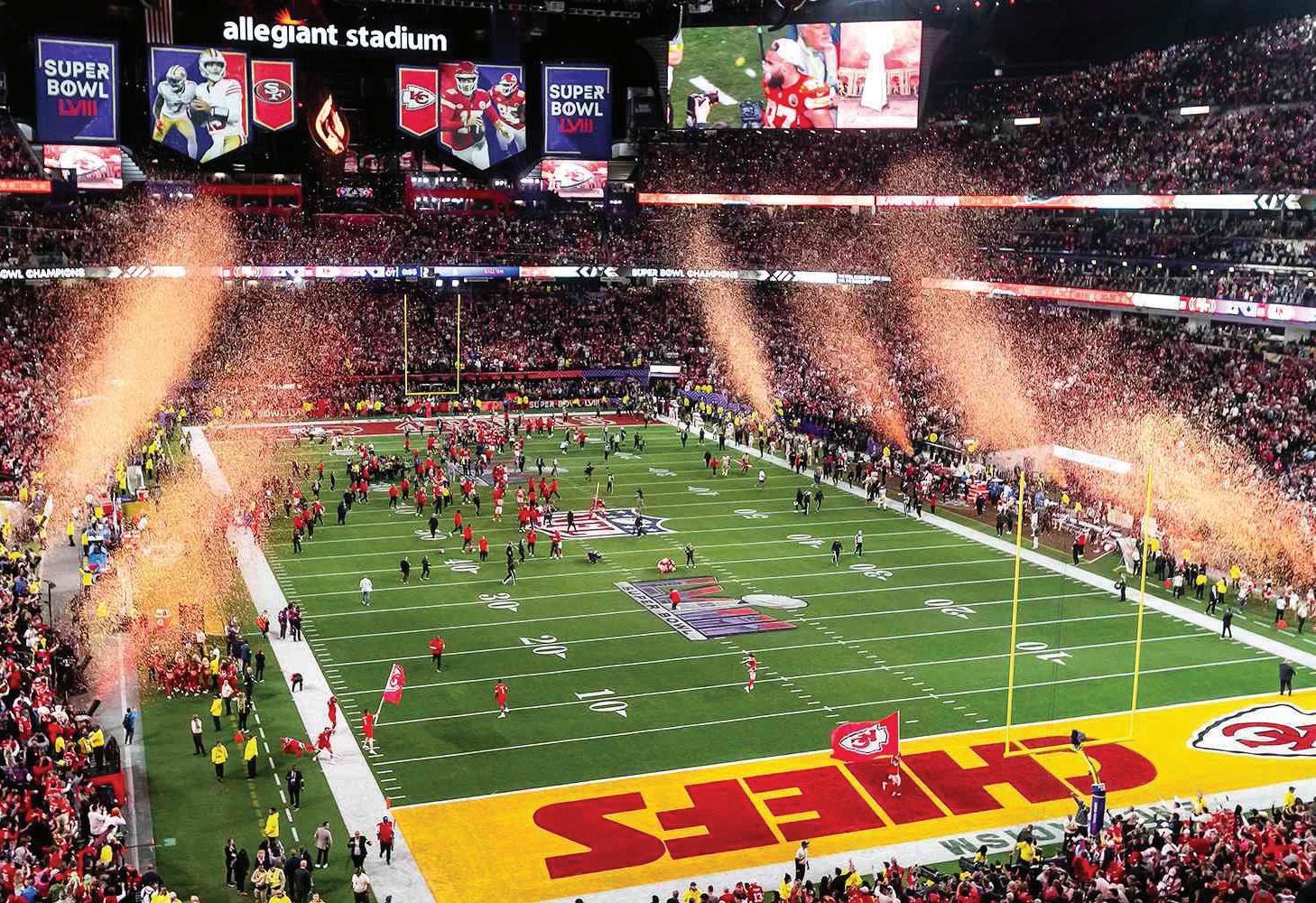
of its marketing in the Land of Lincoln and curbed promotional costs. CEO Jason Robins later dismissed the Illinois tax increase as an outlier and remained sanguine about the stability of imposts elsewhere.
Robins’ optimism notwithstanding, sports betting (and some iGaming) tax increases are on the table in Maryland, New Jersey and Ohio. Also, a coalition of brick-and-mortar casino operators has formed to try and rein in iGaming.
Meanwhile, Robins is flirting with allowing bets to be made using highly volatile cryptocurrency. Like FanDuel, DraftKings can do nothing but sit and wait for the status of prediction markets to be litigated. The latter had a flutter with taking Super Bowl wagers and are coming back for more.
For legacy operators, this can be frustrating, as prediction markets represent a kind of nationwide, unlicensed and unregulated form of sports betting. Nevada is cracking down and other jurisdictions may follow. However, President Donald Trump’s nomination of a Kalshi board member to head the Commodities
Futures Trading Commission casts a dark cloud over the future of legacy operators.
As longtime DraftKings skeptic and Deutsche Bank analyst Carlo Santarelli wrote, “we’re not really sure the risk profile has lessened, as the multiple would indicate, but seemingly the market has taken that view.”
He went on to pen that 2025 would be DraftKings’ make-or-break year: “We expected 2024 to be that year, until the concept of structural hold emerged, and the market mistook sports betting for table games and slots, where holds have a track record, or are manually set, and $500 million of adjusted EBITDA became $181 million.
“Make no mistake, we are by no means saying DraftKings can’t or won’t achieve its targets,” Santarelli cautioned, “but merely pointing out that there is no room for error, [although] … the stock has seemingly shrugged off every fundamental and thematic risk that has emerged over the last several months.”
Santarelli wasn’t sold on the 11 percent hold target, noting that DraftKings hadn’t hit such a metric since 2021. “Perhaps the parlay push continues to work as expected, customers lose faster and replenish more, without being incentivized, as frequently, to do so, and game outcomes go as planned,” he mused, thereby enabling DraftKings to reach the desired 11 percent threshold.
Joseph Greff, of J.P. Morgan, deemed DraftKings’ conservative guidance “prudent, given the industry’s recent sport outcome related hold rate volatility and the upcoming March Madness tournament.” Execs told analysts that betting had picked up since the 2024 presidential election. Were punters previously putting their money on election wagers instead?
DraftKings management didn’t answer that question but did hit the speaking trail, with leadership attending a Jefferies sit-down and a Morgan Stanley-sponsored investment conference. At the former, the company (Katz said) “continues to express confidence in its business and the market in a range of potential scenarios around these current issues.”
Management was resigned to a New Jersey tax increase but felt the exact amount would be negotiated between Gov. Phil Murphy and legislators. “As the first [sports betting] state, New Jersey did a thorough review on the optimal tax rate for state revenue before legalizing and the increase will likely be more moderate,” Katz predicted. “Most importantly, our impression is that the largest operators can mitigate most or all of the increase to retain margins.”
Few fear that Garden State taxation will soar to the usurious heights of adjoining New York State, where online-sports-betting operators pay 51 percent of the gross to the state. Murphy is not seeking anywhere near that amount. Even the Empire State may be having second thoughts, with lawmakers proposing a tax reduction for OSB providers.
Katz penned that “Jackpocket appears to be outperforming expectations to-date in key areas, notably in customer cross-sell in OSB and iGaming. Jackpocket has several advantages in that it is legal in some states where OSB is not … it is a good counter-seasonal asset in that players continue to play even in the sports-offseason, and it should also benefit from the recent change to Mega Millions (tickets will be $5 each instead of $2 starting in April).”
RIGHT: Barry Jonas, Managing Director, Truist Securities

The Jefferies analyst dismissed recent troubles for Jackpocket in Texas as a “minor issue,” but might have spoken too hastily. The third-party app recently exploited a loophole in Lone Star State law, purchasing lottery tickets in every possible winningnumber combination, on behalf of an investment consortium.
Once this was discovered, it exploded into a Texas-sized scandal. Attorney General Ken Paxton called for a fraud investigation, Gov. Gregg Abbott put the Texas Rangers onto Jackpocket’s case and Lt. Gov. Dan Patrick, who controls much of the legislative calendar, advocated banning lottery-courier services … like Jackpocket. Some conservatives even compared the furor to the Enron debacle.

Not only did Jackpocket flee Texas, with conservatives hot upon its heels, it shut down its New Mexico operations. State Attorney General Raul Torrez opined that Jackpocket “was unlawful under state law because it sold lottery tickets for profit without express authorization from the New Mexico Lottery Authority.”
It’s not the end of Jackpocket in the Land of Enchantment but it does mean going back to square one and renegotiating the company’s contract with the Lottery Authority, pursuant to provisions of the Indian Gaming Act. The misfortune was certainly more contained and reparable than in Texas, where Jackpocket sank DraftKings’ hopes for the legalization of sports betting, now too toxic to touch in the wake of a gambling scandal.
Even so, Robins continued to wax optimistic – at the Morgan Stanley conclave and elsewhere – about the prospects for OSB and iGaming legalization. “I feel like we have some real momentum in iGaming now, the first time I’ve felt that way in a few years,” he said on March 3.“We also, I think, will get some sports states done this year.”
“I’m not saying we’ll get a bunch of bills this year,” Robins cautioned. “But whereas … two years ago, I would have told you I don’t even know which state is going to be next or how long it’s going to take, I feel now like we are definitely, if not this year, certainly within the next two sessions, going to get some iGaming bills done.”
Katz shared Robins’ upbeat view, attributing a likelier prospect of iGaming to shortfalls in state budgets, as Elon Musk continues to take a chainsaw to federal aid. An


additional spur was the desire to curb sweepstakes gambling, an unregulated form of iGaming which companies like DraftKings would like to see kiboshed.
Concluded Katz, “Most importantly, our perspective is that historically, operators have been able to recover margins in the medium term against tax increases.” In other words, bring it on.

By Katherine A. Baker & Nicolas Techiera
Last year saw a major increase in sports betting, totaling a record $150 billion across the United States.
[1] From this 26 percent overall increase in wagers since 2023, state and local governments collected about $2.9 billion in taxes, while the federal government collected over $375 million.[2] At the top, more than $22.5 billion was wagered in New York in 2024 – nearly doubling Illinois, the next closest state, at $13.9 billion.[3] Two new states entered the sports betting market in 2024, with several others making strides towards legalization. The year also saw an increase in regulatory restrictions across the country, and an emerging competitor in the sports betting arena – sports-themed prediction markets.
In 2024, North Carolina and Vermont became the two most recent states to officially legalize and launch some form of sports betting. In North Carolina, Gov. Roy Cooper signed House Bill 347 into law on June 14, 2023, to legalize and regulate online sports betting (OSB).[4] On March 11, 2024, North Carolina launched OSB, just in time for the 2024 NCAA basketball March Madness tournament. Similarly, Vermont Gov. Phil Scott signed an OSB bill into law on June 14, 2023.[5] Vermont then launched sports betting on January 11, 2024.

ABOVE: Katherine A. Baker
Even in the short time they have allowed sports betting, North Carolina and Vermont derived $583.6 million and $21.9 million in total gross revenue, respectively, in 2024.[6]
The next state slated to join the sports betting industry is Missouri. During a November 5, 2024, ballot initiative, voters approved a sports
betting bill – House Bill 2331.[7] Sports betting is set to go live by December 1, 2025, with some predicting that it could be much sooner.
The District of Columbia, where sports betting went live in 2019, saw an expansion in available OSB platforms last year. Until 2024, only GamebetDC was authorized to operate OSB, due to a five-year exclusive deal with the D.C. Lottery.[8] In an attempt to generate more revenue, FanDuel took over as D.C.’s official online sportsbook in July 2024.[9] With additional sportsbooks like Caesars, BetMGM and DraftKings already or soon-to-be operational alongside FanDuel, the nation’s capital is poised for a record sports betting year.[10]
Barring any setbacks in Missouri, sports betting remains illegal in only 11 other states – but several are poised to legalize it in the foreseeable future. While sports betting legislation efforts in Alabama, Minnesota and Georgia looked promising in 2024, they ultimately fell short.[11] Notably, the inclusion of OSB was cut from a proposed Alabama bill early in 2024. [12] Minnesota faced pushback in finalizing its legislation but is primed to revamp those efforts in 2025.
Although there is currently no legislation pending in California, Oklahoma, South Carolina or Texas – nor was there a very strong push to legalize sports betting in 2024 –historically the motivation has been present. Early indications of whether these states will continue their efforts to legalize sports betting in 2025 are optimistic.[13] For the remaining states of Alaska, Hawaii, Idaho and Utah, 2024 was unremarkable as these states firmly maintained their antigambling positions. Nonetheless, these states could still pursue legalization in the future, despite a lack of notable progress in prior years.
With an increase in sports betting activity and market participants across the board, it is unsurprising that 2024 also witnessed a trend in tightening regulatory restrictions. Some changes were spurred by concerns around problem gambling and consumer protection, while others aimed to capitalize on the economicdevelopment opportunities that come with an expanded market.
For instance, New York Gov. Kathy Hochul signed a new bill into law that placed additional responsible-gaming restrictions on advertisements by sports betting operators in New York. [14] Specifically, the new amendments require sports betting operators to “clearly and conspicuously state a problem gambling hotline number” on all advertisements.[15]
Also notable, after a series of public roundtables, Massachusetts became the first U.S. sports betting market to investigate the impact of sports betting operators limiting practices on bettors.[16] The Massachusetts Gaming Commission intends to use the information gathered to propose new regulations in response to recent player complaints, such as mandatory disclosures from sports betting operators when they are limiting a player.[17] While Massachusetts is known for its strong consumerprotection measure, other states may follow suit.
Moreover, in 2024 several state legislatures sought to increase their tax rates on sports betting. For example, Ohio increased its rate from 10 percent to 20 percent, starting in the 202324 fiscal year.[18] Likewise, Illinois shifted from a flat, 15 percent rate to a tiered rate between 20 percent and 40 percent.[19] Louisiana, Indiana

and Massachusetts are considering increasing their tax rates on sports betting as well.[20] In the same vein, Maryland has expressed interest in passing legislation to remove promotional deductions[21] – an approach already in place in Virginia, Colorado and Louisiana.
At the federal level, 2024 saw the first congressional hearing on sports betting and responsible gaming[22] on the heels of Rep. Paul Tonko and Sen. Richard Blumenthal’s introduction of the Supporting Affordability & Fairness with Every Bet Act (the SAFE Bet Act),[23] which sought to impose a general ban on sports betting nationwide unless states agreed to adhere to stricter responsible-gambling measures. [24] Specifically, states that have legalized sports betting had to submit an application to the attorney general to administer a sports betting program that could only be approved if the state’s program met the act’s minimum standards.[25] In particular, the act proposed restrictions on sports betting advertising between 8 a.m. and 10 p.m., and during live sports events as these are the mostly likely times minors could be exposed to the sports betting world.[26]
The act also sought to limit the
ABOVE:
amount wagered and the number of wagers for a given bettor.[27] The trade association for the gaming industry, the American Gaming Association, voiced strong opposition. [28] While the SAFE Bet Act was not adopted in 2024, the idea that the federal government could impose standardized rules for sports betting and perhaps other forms of gaming would be unsettling to an industry whose regulation has historically been left to the states. In response, we may see states tighten their responsiblegaming regulation of sports betting to dispel the notion that federal government intervention is needed.
A review of sports betting in 2024 would be incomplete without mentioning a new challenger to the industry: sports-themed prediction markets. These are exchange-traded markets regulated in the U.S. by the Commodities Futures Trading Commission (CFTC) that allow individuals to buy and sell shares on the outcome of a future event.[29] Generally, users answer “yes” or “no” to questions predicting outcomes of events anywhere from the performance of a film at the box office to the weather to election outcomes. These platforms also offer futures contracts on sporting events. Market leaders like Kalshi, Polymarket and Robinhood have been taking advantage of the demand for sports betting but encountered legal challenges.[30]
Given the strict regulatory landscape that has built up around sports betting since the repeal of Professional & Amateur Sports Protection Act (PASPA), the combination of prediction markets and sports has unsurprisingly sparked a debate: Is this
unregulated sports betting?
Some jurisdictions outside the U.S., such as Taiwan, France and Singapore, have attempted to block access to prediction markets, considering them a form of illegal gambling.[31]
Within the U.S., the CFTC under the Biden administration took a broad view of the term “gaming” in its special rule on events contracts (the special rule).[32] While not specific to sports-themed predictions, Kalshi’s suit against the CFTC for ordering it to stop offering futures contracts on U.S. congressional elections results is a critical marker for the legal viability of using prediction markets to “bet” on sports. A U.S. District Court for the District of Columbia decision issued on September 12, 2024, held that the CFTC exceeded its authority by interpreting the special rule to classify election contracts as “gaming” and “activity that is unlawful under any state or Federal law …”[33] The D.C. Circuit will decide whether to uphold the district court’s view that “gaming” must refer to the “act of playing a game” or “playing games for stakes,” or adopt the CFTC’s position that prediction markets like Kalshi’s operate as a form of gaming and involve unlawful activity, therefore violating the special rule.[34]
Toward the end of 2024, in partnership with Kalshi, Robinhood announced it would offer futures trading on the Super Bowl winner. [35] Almost immediately after the announcement, the CFTC ordered it to cut off access to such contracts due to concerns over legality.[36] At the tail end of the Biden administration, the CFTC issued a similar cease-anddesist order to another predictionmarket operator and began inquiring into others.
With the new administration and its changes in the CFTC, however, the
[1] See Tyler Maher, Forbes, Sports Betting Statistics: Legality By State In 2025, (Feb. 4, 2025), .
[2] See Eric Ramsey, Legal Sports Report, Americans Wager Nearly $150B On Legal Sports Betting In Record 2024, (Jan. 15, 2025), https://www. legalsportsreport.com/218449/2024-us-sports-betting-revenue/.
[3] See id.
[4] See Sports Wagering/Horse Racing Wagering, House Bill 347, 2023-2024 Session, (2023), available at https://www.ncleg.gov/BillLookUp/2023/hb347.
[5] See House Bill 127 (Act 63), 2023-2024 Session, (2023), available at https:// legislature.vermont.gov/bill/status/2024/H.127.
[6] See James Bisson, Covers, 2024 US Betting Handle and Sports Betting Revenue Report, (Jan. 31, 2025), https://www.covers.com/industry/2024-bettingrevenue-report.
[7] See House Bill 2331, 102nd General Assembly, 2nd Regular Session, (2024), available at https://house.mo.gov/bill.aspx?bill=HB2331&year=2024&code=R.
[8] See James Bisson, Sportsbook Review, Where Is Sports Betting Legal? All 50 U.S. States In-Depth Review (Nov. 15, 2024), https://www.sportsbookreview.com/ news/legal-sports-betting-states-tracker/.
[9] See id.; see also Grant Leonard, Covers, FanDuel Takes Over as Mobile Sports Betting Operator in D.C., (Mar. 11, 2024) https://www.covers.com/industry/ fanduel-to-take-over-dc-sports-betting-march-11-2024.
[10] See James Bisson, Sportsbook Review, Where Is Sports Betting Legal? All 50 U.S. States In-Depth Review (Nov. 15, 2024), https://www.sportsbookreview.com/ news/legal-sports-betting-states-tracker/.
[11] See House Bill 15, 2023-2024 Session, (2024), available at https://alison. legislature.state.al.us/files/pdf/SearchableInstruments/2024RS/HB151-int. pdf; House Bill 2000, 2023-2024 Session, (2024), available at https://www. revisor.mn.gov/bills/text.php?session=ls93&number=HF2000&session_ number=0&session_year=2023&version=list; Senate Bill 386, 2023-2024 Session, (2024), available at https://www.legis.ga.gov/api/legislation/ document/20232024/221823.
[12] See Pat Evans, Legal Sports Report, Alabama Sports Betting Left Behind As Senate Passes Lottery Bill, (Jan. 15, 2025), https://www.legalsportsreport. com/170449/senate-alabama-sports-betting-lotterychanges-2024/.
[13] See James Bisson, Sportsbook Review, Where Is Sports Betting Legal? All 50 U.S. States In-Depth Review (Nov. 15, 2024), https://www.sportsbookreview.com/ news/legal-sports-betting-states-tracker/.
[14] See Senate Bill 1550, 2023-2024 Session, (2023), available at https://www. nysenate.gov/legislation/bills/2023/S1550.
[15] See id. at § 1 (b).
[16] See Jessica Welman, SBC Americas, MA Regulators to Request Data on Limiting Bettors from Sportsbooks, (Nov. 21, 2024), https://sbcamericas. com/2024/11/21/ma-regulators-limiting-bettor-data/.
[17] See id.
[18] See Joe Boozell, Play Ohio, Breaking: Ohio Lawmakers Agree to Double Sports Betting Tax Rate, Official Vote Pending, (June 30, 2023), https://www. playohio.com/news/ohio-tax-rate-doubles/.
[19] See Robert Linnehan, Sports Betting Dime, New Illinois Sports Betting Tax Rate Goes Into Effect on July 1, (June 7, 2024), https://www.sportsbettingdime. com/news/betting/new-illinois-sports-betting-tax-rate-goes-into-effect-on-july-1/.
[20] See J.R. Duren, Lineups, Louisiana Sports Betting Taxes Could More Than Triple Under New Bill, (Nov.14, 2024), https://www.bingpoker.com/blog/indianaonline-gambling-bill-with-sports-betting-tax-hike-moves/; Bing Poker, Indiana Online Gambling Bill With Sports Betting Tax Hike Moves, (Jan. 31, 2025), https://www.bingpoker.com/blog/indiana-online-gambling-bill-with-sportsbetting-tax-hike-moves/; Justin Byers, SBCAmericas, Lawmaker Aims to Raise Sports Betting Tax Rate in Massachusetts, (May 23, 2024), https://sbcamericas. com/2024/05/23/massachusetts-raise-sports-betting-tax/.
[21] See Ethan Matthew, Covers, Maryland Sportsbooks Could Lose Free Bet Deductions, (Sep. 27, 2024), https://www.covers.com/industry/marylandsportsbooks-may-lose-free-bet-deductions-sept-27-2024.
[22] U.S. Congress, Hearings to examine legalized sports gambling (Dec. 17, 2024), https://www.congress.gov/event/118th-congress/senate-event/336420.
[23] See SAFE Bet Act, H.R. 9590 (2023-2024 Session), (2024), available at https://www.congress.gov/bill/118th-congress/house-bill/9590/text.
[24] See id. at § 101 (a).
[25] See id. at § 102 (a)(1), (b)(1).
[26] See id. at § 103 (b)(7)(C).
[27] See id. at § 103 (6)(F)(iii).
[28] See Devin O’Connor, Casino.org, AGA President Bill Miller Hopeful for Second Trump Administration, (Dec. 16, 2024), https://www.casino.org/news/ aga-president-bill-miller-hopeful-for-second-trump-administration/.
[29] See Matt Burke, Covers, Prediction Markets: What They Are and How They Differ From Sports Betting, (Jan. 17, 2025), https://www.covers.com/guides/ prediction-markets-what-they-are-and-how-they-differ-from-sports-betting.
[30] See Geoff Zochodne, Covers, Kalshi Set to Expand Sports Betting-Like Contract Offerings, (Jan. 30, 2025), https://www.covers.com/industry/kalshisports-contracts-event-trading-betting-expand-achievments-january-2025; see also Ziv Chen, Covers, Super Bowl Predictions on Polymarket Hit Over $1 Billion, (Feb. 10, 2025), https://www.covers.com/industry/super-bowlpredictions-on-polymarket-hit-over-1-billion-feb-10-2025; Brian Sozzi, Yahoo Finance, Robinhood will let you bet on Super Bowl LIX between the Kansas City Chiefs and Philadelphia Eagles (Feb. 3, 2025), https:// finance.yahoo.com/news/robinhood-will-let-you-bet-on-super-bowllix-between-the-kansas-city-chiefs-and-philadelphia-eagles-130159553. html?guccounter=1&guce_referrer=aHR0cHM6Ly93d3cuYmluZy5jb20v&guce_ referrer_sig=AQAAAI6kjCH5mlm-W9DSMYcXZDoLi5wL5ZBtDz3 UWJ8lZRKeB-QbxNhNFSQY2A03c0x4ThBx0f4zUqDfD5SKZvjH QGSA3Ply09iWvfXlhNReYF05rdpRoZ5NAuWQSrZur8FLMjGb3ur 0x8ZokR8zp1SgQug7CtVwVMCHVdvxjfUZJG6f.
[31] See Sam Reynolds, CoinDesk, Analysis: Prediction Markets Have a Gambling Problem, (Jan. 14, 2025), https://www.coindesk.com/policy/2025/01/14/analysisprediction-markets-have-a-gambling-problem.
[32] See Robert Ward, Ifrah Law, CFTC “Special Rule” Interpretation Led to an October Surprise, (Oct. 23, 2024), https://www.ifrahlaw.com/ifrah-on-igaming/ cftc-special-rule-interpretation-leads-to-an-october-surprise/.
[33] KalshiEX LLC v. CFTC, No. No. 23-3257 (D.D.C. Sept. 12, 2024).
[34] See id., Docket No. 51.
[35] See Alexander Osipovich, MSN, Robinhood Yanks Betting Contracts After Regulator’s Pushback, (Feb. 4, 2025), https://www.msn.com/en-us/sports/nfl/ robinhood-yanks-super-bowl-betting-contracts-after-regulator-s-pushback/arAA1ypoVz?ocid=BingNewsSerp.
[36] See id.
[37] See Jesse Hamilton, CoinDesk, Trump’s CFTC Head Slams Prediction Markets Resistance Under Predecessor, (Feb. 5, 2025), https://www.coindesk.com/ policy/2025/02/05/trump-s-cftc-head-slams-prediction-markets-resistance-underpredecessor.
[38] See Sabrina Toppa, TheStreet Roundtable, Trump selects Brian Quintenz to head CFTC as agency’s oversight over crypto may grow, https://www.thestreet. com/crypto/policy/trump-brian-quintenz-cftc-head.
[39] See Geoff Zochodne, Covers, CFTC Says Sports Betting Laws An Issue for Prediction Markets, (Feb. 6, 2025), https://www.covers.com/industry/ kalshi-cftc-crypto-sports-betting-event-contracts-roundtable-concernsfebruary-2025; see also CFTC Release Number 9046-25, CFTC Announces Prediction Markets Roundtable, (Feb. 5, 2025), https://www.cftc.gov/PressRoom/ PressReleases/9046-25.
outlook is favorable for the expansion of prediction markets into the sports world and beyond. Acting CFTC Chair Caroline Pham, installed by President Trump, has been vocal about her disfavor of the CFTC’s campaign against prediction markets.[37] The president’s nominee for chair, Brian Quintenz, is also a favorable draw for prediction markets given he is head of policy for venture capital firm Andreessen Horowitz’s (a16z) crypto
fund. He previously served on Crypto. com’s advisory council and is known for his pro-innovation stance.[38]
The CFTC is holding a roundtable in the first quarter to “develop a robust administrative record with studies, data, expert reports, and public input from a wide variety of stakeholder groups to inform the Commission’s approach to regulation and oversight of prediction markets, including sportsrelated event contracts ...”[39]
The legal landscape around prediction markets is likely to remain unsettled for the foreseeable future. The rise of sports prediction markets alongside the expansion of regulated sports betting will be one of the most fascinating trends to watch in 2025.
Sports betting saw major expansion in 2024 with more people playing it, more states legalizing and regulating it, and more companies pushing its limits. Going forward, the sports betting industry should expect to enjoy continued customer demand while navigating increased regulation and sources of competition.
Katherine Baker, a Boston-based partner at Nelson Mullins Riley & Scarborough LLP and chair of the firm’s Gaming Industry Group, assists casino gaming, igaming, sports betting and fantasy sports operators, vendors, and entrepreneurs in navigating the state and federal commercial, and tribal gaming landscape, including leveraging fintech solutions
Nicolas Techiera is a Boston-based associate at Nelson Mullins Riley & Scarborough LLP. He focuses his practice on a broad array of litigation matters, with a focus on complex commercial litigation and business disputes, insurance defense, construction disputes, and gaming and gambling matters.




CEO Brooks Pierce. By Peter White
To some, Inspired Entertainment is a purveyor of slot routes, with 50,000 machines in the field. But it has many more strings to its bow. It has expanded its reach, with the collaboration of bet365, into iGaming, sports betting and eSports. Company President Brooks Pierce sat down with our publisher, Peter White, to discuss how Inspired is pushing the online envelope.
Can you tell us about the partnership with bet365 and how your collaboration has been with this giant of the sports betting world?
Our partnership with bet365 exemplifies innovation, trust and a shared vision. Over the past decade, this collaboration has become a cornerstone of Inspired’s success. Together, we’ve delivered a diverse portfolio of gaming content, ranging from virtual sports to online slots, ensuring that bet365’s players enjoy exceptional gaming and sports betting entertainment.
What makes this collaboration so dynamic is bet365’s commitment to providing their players with entertaining experiences. This includes showcasing nearly our entire virtual sports portfolio and an extensive

array of interactive content. By integrating our latest and greatest, bet365 continues to push boundaries with products that resonate with their audience, delivering seamless, engaging experiences across multiple markets.
Notably, bet365 was the first UK operator to launch Hybrid Dealer Roulette in Q4 2024. This milestone underscores the strength of our partnership, and bet365’s commitment to player engagement and satisfaction. As we continue this journey together, we look forward to achieving even more groundbreaking successes.
Central and South America are strong markets for sports betting. Can readers expect further announcements for the region in the year ahead? What is Inspired Entertainment’s current commitment in the jurisdictions where you operate?
Both Central and South America are integral to our growth strategy. We
have already tailored our industryleading Virtual Soccer product specifically to the Brazilian market, enhancing it with the iconic stadium atmosphere that resonates with local fans. This has resulted in the launch of V-Play Football Brazil, an immersive experience that captures the energy of Brazil’s legendary venues.
Inspired is fully committed to expanding our presence in the region while upholding compliance with all market regulations. In January 2025, we a started the rollout of online and mobile slot games in Brazil. Brazilian players are now able to enjoy global hits like Gold Cash Free Spins, Cops ‘n’ Robbers Big Money and Big Piggy Bank, alongside exciting new titles such as Kong Wonder Wilds and record-breaking Wolf It Up! To further enhance accessibility, we have launched a dedicated Brazilian Portuguese section on the Inspired Web site, featuring localized content: inseinc.com/pt-br.

How have the last 12 months been for Inspired Entertainment and how do you see 2025 for further growth? The past year has been transformative for Inspired, marked by strong performance across key segments and significant progress in our strategic initiatives.
We have maintained our leadership in markets such as the UK and Greece, while expanding our Virtuals division into new territories through marketspecific approaches. Our notable partnerships with the NFL, the NBA, and the recently announced collaboration with the NHL have elevated our virtual sports offerings, providing the authenticity and brand prestige that sets our
content apart.
Our Interactive segment achieved remarkable growth in both revenue and EBITDA, fueled by our expansion efforts across the UK, North America and Europe. The success of our Hybrid Dealer initiative, including the launch of MGM Bonus City with BetMGM in Michigan, and upcoming expansions into Canada through Loto-Québec, has further solidified our position in the industry.
In 2025, we will continue to focus on expanding our digital presence, optimizing our land-based operations, and pursuing growth in high-potential markets like Brazil. With ongoing initiatives, including the development of Hybrid Dealer products, enhanced virtual sports content, and strategic partnerships, we are confident in our ability to achieve sustainable growth and create long-term value for our shareholders.
What is Inspired Entertainment’s approach to responsible gambling?
Inspired is committed to minimizing the number of problem gamblers, while ensuring that we preserve the enjoyment of those who choose to gamble for entertainment. We operate exclusively in regulated markets, and we work closely with government regulators and stakeholders in each country to protect those at risk of problem gambling. We do this through:
• Fairness: We utilize secure, regulated systems and ensure that our content and platforms undergo independently testing.
• Transparency: We provide accessible information regarding return to player (RTP) rates on accessible help pages.




• Funding: We contribute financially to various charitable organizations committed to researching, preventing and treating problem gambling in the countries in which we operate.
• Research and development: We share data to better understand the causes of problem gambling and to create world-leading player protection software.
• Education: We provide clear guidance to our employees, customers and the public regarding signs of problem gambling, who to contact for help, and intervention advice where appropriate.
What games are you launching into the Mexican market?
Last year, we announced the rollout of 50 online slot games in Mexico in partnership with bet365. This premium collection combines proven hits with new releases specially designed for the Mexican market. The addition of bet365 Mexico complements our strong roster of existing customers there, which include Caliente and Novibet. This launch not only reinforces our long-standing collaboration with bet365 but also reaffirms our commitment to delivering unforgettable gaming experiences worldwide.


monitoring the space. While the genre remains somewhat of a niche, it is expanding quickly and has significant future potential. We are actively exploring additional eSports titles to diversify our portfolio further, ensuring our virtual offerings appeal to a broad audience, whether they prefer traditional sports or emerging verticals. Innovation remains at the heart of our approach.
How important is it for Inspired Entertainment to promote your eSports betting alongside sports betting?
We remain focused on staying ahead of industry trends, and eSports continues to grow rapidly. We introduced our first virtual eSports product last year, after closely


Understanding AI’s role in sports betting. By Scott Rowan
Artificial Intelligence (AI) is reshaping the sports betting industry, from odds compilation to player retention and much more. But to truly understand AI’s role – and its risks – you need to grasp Predictive Processing, a
cognitive science theory that explains how both humans and AI make decisions.
Predictive Processing (PP) is the idea that the brain doesn’t passively receive information; instead, it constantly predicts what will happen next and updates its models based
on errors. This theory, developed by leading theorists such as Karl Friston and Andy Clark, shows that perception, learning and decision-making are all about minimizing prediction errors –essentially, improving the brain’s model of the world.
This is also how AI works and it is this theory that has been used to build our AI: Algorithms analyze past data, make predictions about future outcomes and refine their models when those predictions are wrong. The better the model, the fewer the mistakes. This predictive loop is fundamental to AI’s success in many fields – including sports betting.
But here’s where it gets tricky: Humans and AI operate differently. AI doesn’t care. It doesn’t weigh emotional, psychological or ethical nuances. While AI can improve decision-making in sports betting, relying on it blindly can lead to disastrous consequences.
When used correctly, AI can be a powerful tool in sports betting, revolutionizing key areas such as:
1. Odds setting and market adjustments
AI can analyze vast amounts of historical and real-time data to set accurate odds. By detecting patterns and adjusting for new information instantly, AI-powered models can optimize pricing far beyond traditional human capabilities.
2. Player risk profiling and fraud detection
AI can flag unusual betting behaviors, identify syndicates and prevent fraud. It can also assess a player’s risk level based on betting patterns, helping sportsbooks manage liabilities effectively.
3. Personalized marketing and retention strategies
AI can tailor offers, bonuses and messaging based on a bettor’s preferences, engagement and betting history. This level of personalization increases customer loyalty and lifetime value.
4. Automated customer service and chatbots
AI-driven chatbots can handle thousands of customer inquiries simultaneously, improving response times and reducing operational costs.
There’s no doubt – AI offers massive efficiency gains. But here’s what nobody is talking about: If you don’t understand the limits of AI, it can destroy your sports betting business.
1. AI has no human understanding –and that’s a problem
The biggest misconception is thinking that AI “knows” what it’s doing. It doesn’t. AI doesn’t think – it calculates based on past data. But sports betting is filled with human variables that AI struggles to quantify, such as:
• Emotional motivations behind bets
• Social dynamics influencing betting trends
• Unexpected human behavior (e.g., fans betting on their team despite poor odds)
AI models can’t truly understand these elements. That’s why sportsbooks that rely purely on AI often make critical errors in pricing, promotions and player engagement.
2. AI can kill the player experience
Sports betting isn’t just about probabilities – it’s about excitement, storytelling and psychology. If you use AI to over-optimize your platform, you risk turning it into a sterile, impersonal experience. Players don’t want to feel like they’re betting against an algorithm; they want to feel like they’re part of the action.
3. AI can lead to bad risk-management decisions
Many sportsbooks trust AI models for risk management, but these models only work under predictable conditions. When something unexpected happens – like a global pandemic, a rule change or a new betting trend – AI struggles to adapt quickly enough. If a business relies too heavily on AI, it may fail to react appropriately to unforeseen risks.
4. AI can cause over-reliance and strategic blind spots
If everyone is using AI the same way, where is your competitive advantage? The reality is that many sportsbooks are all feeding AI with the same data, leading to identical strategies. The real winners will be the ones who combine AI insights with deep human expertise to find opportunities others miss.
winning formula: AI + cognitive science + human expertise
So, what’s the right way to use AI in sports betting? The answer is balance. The businesses that will win the sports betting battle are those that integrate AI while understanding its limitations. They will:
Use AI for automation and efficiency but keep human oversight for key decisions.
Leverage behavioral science to predict human betting behavior better than AI alone.
Apply Predictive Processing insights to improve risk management and user engagement.
Understand the nuances of player psychology to create a superior betting experience.
Work with the only trainer and consultant who understands all these areas in the iGaming industry. Most sports betting consultants either focus on AI or on business strategy. But the truth is, to truly succeed,you need both. I am the only consultant in the iGaming industry who combines:
• Deep expertise in AI and Predictive Processing (understanding how AI models work)
• Behavioral and cognitive-science insights (understanding how bettors actually think and behave)
• 15 years of experience in sports betting and iGaming
If you get your AI strategy wrong, you will pay the price. If you get it right, you can dominate your market.
AI predicts trends but behavioral science explains why they happen. I train iGaming teams to use both AI and behavioral insights to improve acquisition, customer engagement, risk management, profitability and much more.
Reach out to me on LinkedIn: Scott Rowan. Let’s have a chat
連接亞洲娛樂行業 與驅動業務的樞紐


A guide to the ins and outs of wagering on sports behind the former Iron
By Marko Mitevski
Sports betting has expanded globally in recent years, but this industry has been widely present in Eastern Europe since the late 1990s. Usually, this region is way behind world trends, but when it comes to sports betting, you will probably find the largest so-called betting experts per capita in the world.
There are many reasons for that, and it has a lot to do with economics and culture. This region had many geopolitical turbulences in recent decades, which resulted in poverty, inflation, corruption and unemployment. Sports betting has opened many jobs in this region and, at the same time, given people hope that they can win money quickly and easily.
This process started quietly in the late 1990s, and today there are bookmakers at every corner. The bookmaker companies in countries like North Macedonia are among the top 10 in annual profits considering every industry.
In most of the countries in Eastern Europe, online betting organized by foreign companies is prohibited by law, so the vast majority of the money from sports betting stays there. That has made these companies gather huge capital and power. For instance, basketball clubs Red Star and Partizan from Serbia are both sponsored by betting companies that are added to the teams’ names. Just to give a

perspective of how big these clubs are, Partizan has an average attendance of 19,916 fans in their home games in the EuroLeague, which is significantly more than 18,324 in the NBA in the 2023-24 season. There is a huge competition in the market, and some of the bookmakers have brought in sports legends like Ronaldinho or Gabriel Batistuta for local advertising.
However, enough with that, let’s get into the real betting culture in this region. The biggest difference between sports betting in this region and the U.S. is the fact that in Eastern Europe, online betting almost does not exist. Yes, you can place a bet on worldwide bookies from some of these countries, but accepting the winnings to your account in a local bank can put you in legal trouble.
So, if you want to place a bet, you will need to visit a bookmaker site, and they are literally everywhere. You

cannot go to the market, bus station, or pick your kid from school without passing by one of these sites. They usually operate by midnight, and on game days you may even have to wait in line to place your bet.
Around 75 percent of the male population in Eastern Europe is betting occasionally or regularly, so sports betting is one of the most common topics people are talking about. You can have a law degree, be an artist and work out every day, still, you will most likely hear about sports betting on a daily basis.
The bookmakers in this region follow the trends when it comes to the events you can bet on. Soccer is the main sport, but you can also place a bet on any sport in the U.S. professional leagues, tennis, volleyball, you name it. However, no sporting event comes even close to the popularity of betting on soccer. Most of the pundits in this region would rather bet on a soccer game from the Finnish Third Division that they cannot even watch on TV than on an NBA game, the Super Bowl or the World Series.
Soccer is a religion here. So if you know who got injured in the last game in Australia, if the team in Belarus did not get paid on time this month or if your cousin knows a man who went to school with a domestic player who now plays in the German fifth division,
you are the man. These are hot takes that make you stand out among other sports experts in this region.
The events you can bet on can be found on the bookmakers’ websites, but there are many pundits who prefer the old-fashioned way of spending hours going through the printed version of the games, looking for the right bets.
Unlike the U.S., most of the pundits in Eastern Europe are betting on parlays instead of single bets. One of the reasons for that is the buying power of the population. Most of the pundits are not able to place a wager higher than a couple of bucks, so in order to win a significant amount, many are putting 10 or more games on their bet. At the end of the day, it is just for fun, right?
However, sometimes the fun part goes away as the betting industry has a huge impact on society. At the beginning of the expansion in the late 1990s and early 2000s, even juveniles could have placed a bet. Today it is regulated that no person under 18 can enter a betting site, but kids always find a way. Don’t be surprised if on your way out of one of these places, you are stopped by a kid who kindly asks you to place a bet for him. This problem has gone so far that there are organizations that demand law amendments that would prohibit betting sites from being located closer than 500 yards from a school.
Another issue that not many are talking about is fixing games. There are many team owners with a suspicious background, players with low salaries and corrupted institutions, which makes this region an ideal place for fixing games.
If you ever travel in this part of the world, there is no way you will miss a booking site, and it is up to you if you would try your luck.
International Betting Integrity Association (IBIA), the leading voice on integrity for the licensed global sports betting industry, has published its 2024 sports betting integrity report. Whist there are some notable findings, the overall integrity position remains relatively consistent with previous years.
The report highlights that the total number of suspicious betting alerts reported in 2024 was 219, an increase of 17 percent on the revised 2023 figure of 187 alerts. However, the 2024 figure remains 11 percent below the annual average of 245 alerts during 2020-23.
Football and tennis continue to account for the majority of suspicious betting alerts, with a combined 133 cases accounting for 61 percent of all alerts. This is a slight decrease from their 64 percent share in 2023.
There was a slight increase in football alerts, from 63 alerts in 2023 to 75 in 2024, and a downward trend in the proportion of matches reported for suspicious betting activity on tennis matches continued in 2024. The 58 tennis matches reported in 2024 represent 26 percent of all matches reported. This is down from 29 percent in 2023. These sports were followed by table tennis with the alerts increasing from 22 in 2023 to 36 in 2024, and esports, which saw a more significant increase in alerts from seven in 2023 to 32 in 2024.

A geographical shift away from European sporting events was also observed, with suspicious betting on sporting events in Europe falling from 113 alerts in 2023 to 80 in 2024. Meanwhile, alerts in Asia increased from 17 to 40, and Africa’s increased from 16 to 28. This means Europe’s share of all alerts reported has dropped to 37 percent, with Asia now accounting for 18 percent and Africa 13 percent.
IBIA is keeping a close eye on these trends to determine whether they’re just anomalies or a growing trend that will require action.
Suspicious betting alerts spanned 12 sports across 53 countries in 2024, with the Czech Republic (19) and Turkey (11) topping the list. In 2023, the UK (31), Czech Republic (18), Brazil, and Spain (11) were the countries where the most suspicious sporting

events took place. IBIA data played a key role in sporting investigations, leading to 33 matches being deemed corrupted and 17 sanctions against clubs, players, and officials for betting violations.
IBIA uses suspicious-betting-activity data from its unique global-monitoring network, covering over $300 billion in betting turnover (handle) per annum to help sports, regulators, policymakers and law enforcement to investigate and prosecute criminals. Additional functionality was added to the association’s monitoring platform
in 2024, with that technological upgrade enhancing the association’s ability to detect and report suspicious activity on its members’ betting markets.
As with all potentially corrupt activity, IBIA is analyzing the data and working with its members and global-integrity network to implement targeted countermeasures. IBIA’s growing membership is resolute in its commitment to identifying, disrupting, and preventing corrupt sports betting activity and to working with stakeholders.
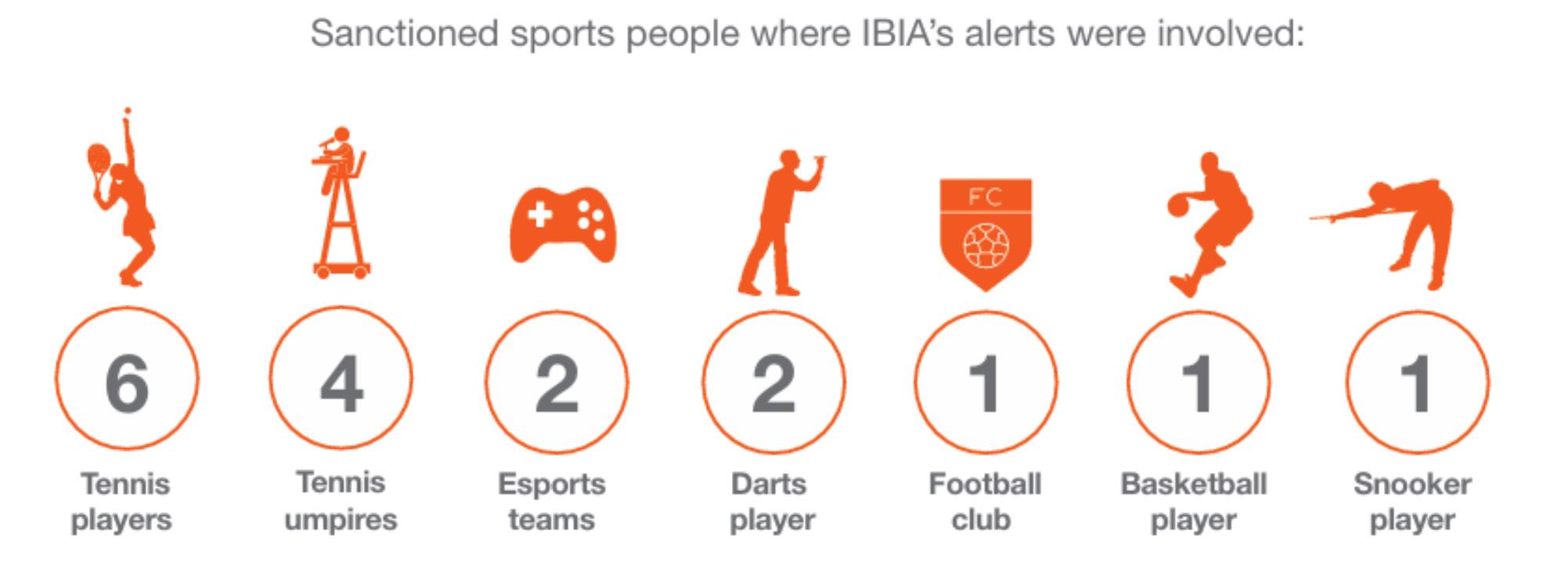
Although it may be too dramatic to call it a revolution, the changes that have taken place in the Brazilian sports betting market over the last few years have certainly been transformative.
There has been a massive increase in the number of international and domestic sports betting companies that are now licensed to operate in Brazil. According to The Availability of Sports Betting Products: An Economic & Integrity Analysis, published last year, Brazil is now projected to create $34 billion in sports betting turnover by 2028. All of this has been enabled by a new Brazilian sports betting regulatory regime.
The transformation of the Brazilian sports betting regulatory and market landscape has been accompanied by a real commitment by the government to strengthen the sports-integrity ecosystem. This includes, for example, a legislative provision that requires licensed operators to be part of an international integrity-monitoring body.
With the increased growth of the sports betting industry in Brazil and other markets,comes a greater responsibility to protect customers, sports and betting operators from match-fixing. Central to this is the

need to create fit-for-purpose, sportsintegrity ecosystems.
This ecosystem includes sports betting integrity-education programs designed to educate players, officials and other sporting personnel about the dangers of match-fixing. This is key to protecting the integrity of sporting competition. So is the need for sports governing bodies to embed the highest standards of governance, and enforce robust match-fixing rules and sanctions.
Overly burdensome regulatory and fiscal environments increase the risk of corruption and match-fixing by driving

sports betting customers offshore into unregulated markets. These are mostly in Asia, where most of the problems with sports integrity arise. So balanced, efficient, and evidencebased policy and regulation is another key element of this ecosystem.
The ability to detect, deter, and sanction sports betting related matchfixing and fraud is also absolutely crucial. For the sports betting industry this involves detecting and providing suspicious betting data, and working closely with sports, regulators, policymakers, and law enforcement as they investigate and prosecute criminals. What underpins any successful sports integrity ecosystem is collaboration, amongst all key stakeholders, and the ability to innovate.
An important but too often neglected element of this ecosystem is the
ability to successfully clamp down on financial fraud. Whether it relates to money laundering, fake accounts, credit cards and payments, financial fraud is a criminal activity and one that undermines the integrity of the sports betting industry and integrity ecosystem. A well-regulated betting ecosystem relies on trusted financial services that prioritize integrity, transparency and consumer protection.
Cooperation between financial services, regulatory authorities, and betting operators is therefore essential to tackling financial fraud and maximizing the potential of the Brazilian sports betting sector. This is why – in a pioneering move to bolster the integrity of Brazil’s newly regulated and rapidly expanding sports betting market – IBIA recently launched a dedicated Payment Provider orum.
The objective of the Forum is to bring together key industry players to tackle some of the most pressing challenges facing the regulated betting sector. It will foster collaborative activities that protect the market from financial fraud related to competition manipulation and contribute to a secure, transparent, and responsible betting environment in Brazil. The Forum will serve as a vital platform for aligning payments, regulatory frameworks and market integrity.
Payment providers play a vital role in maintaining sports betting integrity. It is very encouraging, therefore, that the project was launched with six key payment providers – Bazk, Z.ro Bank, OneKey Payments, OKTO, VPag and Pay4Fun. All of the partners are committed to driving meaningful collaboration and have signed up to a declaration that commits them to:
• Collaborate in the development of standards and best practices for payment processing.

• Engage with regulatory bodies to defend a robust, fair and effective regulatory framework.
• Promote responsible gambling and consumer, market, and sportingevent protection.
• Share knowledge and expertise to innovate and improve the payments ecosystem.
• Maintain the highest standards of ethical conduct and compliance with regulations.
Their collective expertise will be instrumental in setting industry benchmarks, fostering regulatory dialogue, and ensuring a transparent and secure sports betting ecosystem in Brazil.
With IBIA’s members forecast to generate over 70 percent of remote gross gambling revenue in Brazil, the Forum will benefit from IBIA’s extensive knowledge of sports betting integrity issues and trends, obtained from our world-leading, global-integrity monitoring and dataintelligence network. That includes
many of the world’s largest regulated betting operators, active across six continents, and partnerships with leading sports bodies and gambling regulatory authorities. The forum will also leverage IBIA’s expertise in establishing industry standards, such as its Data Standards Kitemark.
The Payment Forum, which is cochaired by Ari Celia (Pay4Fun) and Marcelo Bueno M. Carneiro (Z.ro Bank), alongside IBIA, held its first meeting in Rio de Janeiro in February. The meeting covered many of the challenges facing Brazil’s regulated betting sector including:
• Combating illegal operators: Strengthening enforcement and protecting the regulated market.
• Money-laundering risks: Tackling links to sport-betting manipulation.
• Regulatory impact: Assessing new ordinances and their effectiveness.
• Emerging industry issues: Shaping the future of payments and compliance.
Regulatory and other institutions linked to financial payments and competition manipulation will be

invited to join Forum meetings. They will have the opportunity to engage in the development and implementation of innovative preventative actions against financial fraud.
Whilst it is still at an early stage, we believe that the Forum’s cross-sector
partnership approach to tackling financial fraud will help address a missing element in the Brazilian sports integrity ecosystem. It brings together key industry players to tackle some of the most pressing challenges facing the regulated betting sector.
The Forum provides further confirmation that, with its new regulatory framework and increased focus on tackling sport betting related match-fixing and fraud, Brazil is becoming an innovator and sports integrity leader.
IBIA will be assessing the potential benefits of replicating this group in a wider international setting. Where Brazil is leading, we hope and expect other countries in the LatAm region and elsewhere to follow. We’re excited about the journey ahead and look forward to driving real impact in the industry. Let’s build a sustainable and thriving betting market together!





























2 - 3 JULY 2025







